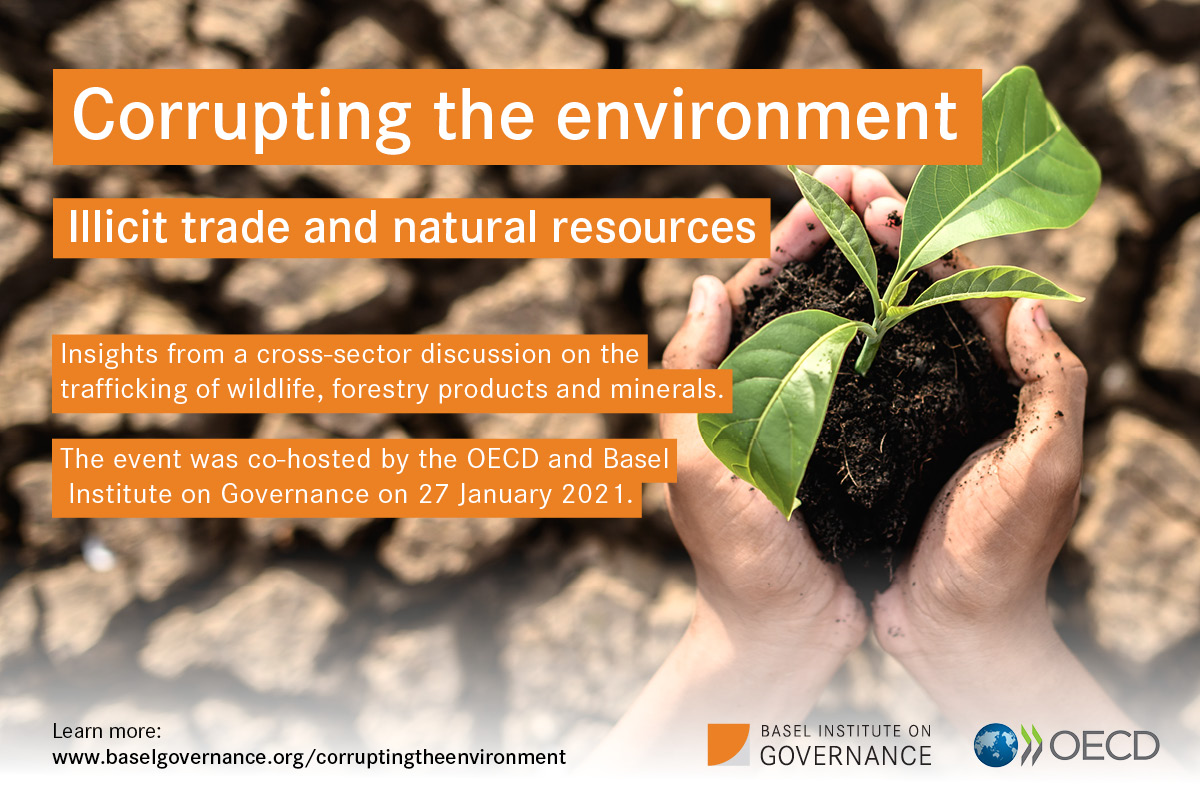Combating the illicit trade in natural resources together

Smart use of technology, concerted cooperation both across and within sectors, and information sharing on risks and risky actors are key to combating the rampant trade in illegal goods, including wildlife, minerals and forest products.
These were strong takeaways of a virtual discussion on illicit trade and natural resources on hosted by the OECD and Green Corruption team of the Basel Institute on Governance on 27 January 2021.
Attended by 181 participants, the event featured a varied panel representing law enforcement, regulation, NGOs and the private sector. Clips of the various presentations are available on this playlist.
Here are a few takeaways among the many interesting points raised:
Two sides of technology
Increased digitalisation across all sectors has an important role to play in reducing corruption risks as it boosts transparency, information sharing and the efficiency of due diligence checks. These are key benefits of electronic permitting systems such as the ASYCUDA eCITES system.
Notwithstanding, increased digitalisation poses new risks for illicit trade in natural resources. The rise of popular web platforms for trading and advertising has further facilitated the illegal wildlife trade, with NGOs noting a significant increase in the trade of ivory, pangolin scales and exotic pets on social media platforms.
This poses new challenges that cannot be solely addressed by law enforcement. It requires the commitment of private companies to implement systems to filter and share usable information on e-commerce activity and other relevant information with law enforcement. Through the Coalition to End Wildlife Trafficking Online, the major tech companies are making strong progress, but there is a danger of driving more illegal trade into the dark web.
A shared responsibility
Governments, regulatory bodies, the private sector and civil society all have a different but important role to play in assessing and mitigating the risk of corruption concerning the licit and illicit trade in natural resources.
For example, CITES is supporting governments to address corruption risks in wildlife supply chains, including through guidance documents and assistance in developing preventive strategies in line with a 2016 resolution on countering corruption that violates the Convention. A 2019 resolution on legal acquisition findings emphasises the requirement to verify the legality of wildlife specimens before authorising their export.
Greater government commitments and clearer regulations would support the efforts of proactive transport companies to prevent their systems being misused for illicit trade in wildlife goods. NGOs can also help companies with information to support risk assessments, internal investigations and training.
Cooperation across and within sectors
There needs to be increased cooperation not only between but also within sectors. For law enforcement, this means proactive bilateral and multilateral collaboration on cross-border investigations. Strong platforms for cooperation exist, via INTERPOL as well as between national police forces, customs agencies, coastguards and other authorities. The need now is to use them systematically and proactively.
For the private sector, areas crying out for collaboration include more harmonised systems to reduce document fraud and the exchange of data regarding blacklisted and red-listed customers. A Collective Action approach involving an independent third party would mitigate anti-trust risks. Successful initiatives in the private sector include United for Wildlife Transport and Financial Taskforces and the ROUTES Partnership for the airline industry.
Illicit trade in natural resources has much in common with illicit trade in other goods, such as tobacco, narcotics, weapons or counterfeit medicines and vaccines. Practitioners and companies see many of the same criminal networks, techniques, and investments in logistical and financial capacities. Due diligence and track-and-trace systems implemented to prevent smuggling of other goods could serve as inspiration and a part of the solution.
Also crucially, existing tools for addressing corruption and organised crime risks across all areas – such as financial investigation, anti-money laundering, asset recovery, and public-private cooperation – can help turn illicit trade in natural resources into a high-risk, low-reward game. This is the idea behind an October 2020 resolution at the Conference of the Parties to the UN Convention Against Transnational Organized Crime (UNTOC) on Preventing and combating crimes that affect the environment.
With thanks to our esteemed panel:
- Piotr Stryszowski, Senior Economist, Task Force on Countering Illicit Trade, OECD (moderator)
- Sofie H. Flensborg, Legal Advisor, CITES Secretariat
- LCL Christian Tournié, Deputy Head of the Office for European and International Affairs, Central Office for Combating Crimes against the Environment and Public Health, France National Gendarmerie
- Crawford Allan, Senior Director Americas and Wildlife Crime, TRAFFIC
- Guilhem Isaac Georges, Senior Manager, Sustainability, CMA CGM
- Alvise Giustiniani, Vice President of Illicit Trade Prevention, PMI
More
- View video clips of the participants on the Corrupting the Environment playlist on YouTube
- Download the audio version
- Learn more about the OECD-Basel Institute Corrupting the environment series and register now for upcoming events on mineral supply chains (23 February) and following the money (17 March).



